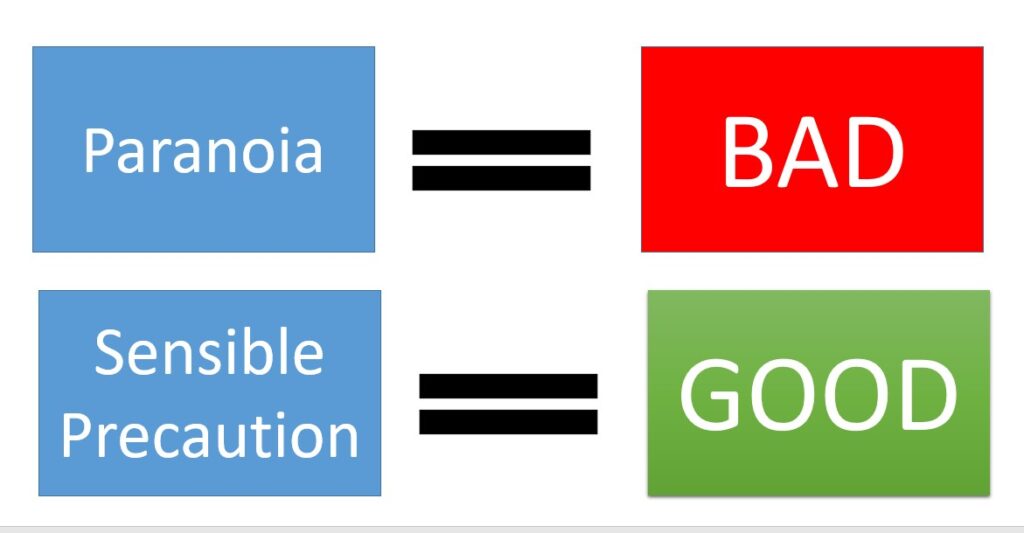The most infuriating articles are written by otherwise impressive scholars. One such article is Roderick Kramer’s When Paranoia Makes Sense. Written in the aftermath of the September 11th terrorist attacks and the Enron debacle it may have resonated at the time. Still, it is irredeemably flawed and socially malignant. Kramer should have known better. Paranoia Doesn’t Make Sense.
Calm Down
In difficult times I think we should encourage people to calm down rather than be paranoid. But that is just my opinion. What isn’t an opinion? That Kramer’s attention-grabbing advice is total gibberish.
He praises but doesn’t define paranoia. He doesn’t mean anything technical so what does he mean? Some things he’d class as paranoia are sensible. Don’t withdraw your life savings, get drunk and stagger down a dark alley at 2am. If by paranoia he means sensible precautions, why not say sensible precautions? Furthermore, if he means sensible precautions I agree. Who doesn’t agree? Why bother writing it? “When sensible precautions make sense” isn’t going to be published.
So to get published he needs to surprise. To “prove” paranoia is good he appeals to a host of anecdotes — some fictional — and uncontextualized data. According to Kramer “eight out of ten executives reported having made a major mistake with respect to trusting the wrong person at least once in their careers” (Kramer 2002). This is a totally useless statistic. If they each trusted numerous people is it surprising it didn’t always work out? Furthermore, it is incorrect to judge how good a decision is from a single outcome. If things never go wrong you are probably not taking enough risks. If you never trust anyone you forego the benefits of trust (that Kramer lists). You simply can’t judge whether a decision was good without knowing the costs, benefits, and likelihood of being let down. Trust has large payoffs but sometimes it goes wrong. That’s life. Get over it.
Adding Prudent Is A Weak Bit Of Back-Peddling
Kramer praises paranoia but doesn’t want to advocate for its evils. To escape this problem caused by his attention-grabbing stunt in praising paranoia Kramer suggests paranoia should always be “prudent”. We aren’t sure what he means by paranoia but he assures us it is positive as long as it is prudent. How do we know when paranoia is prudent? Paranoia is prudent when it works well in any given decision. So paranoia is good when it works and not so good when it doesn’t.

Kramer’s advice is infuriating. At best the advice is meaningless. At worst it supports those who believe that refusing to cooperate with others is some form of higher wisdom.
Paranoia doesn’t make sense. By definition, it misses the benefits from trust. Kramer knows this so he invents “prudent paranoia”. It has all the good parts of paranoia without the cost. Hurt? You should have been more paranoid. Missed opportunity? Your paranoia wasn’t prudent. Infuriating.
For more on paranoia see here and here.
Read: Roderick Kramer, When Paranoia Makes Sense, Harvard Business Review July 2002
